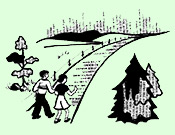
By Lois E. Wilson
Do you like to sing in the shower, when gardening, doing chores, or driving alone? No matter our talent, many of us do. Walter Savage Lander observed, “There is delight in singing though none hear it beside the singer.” If we have a soprano, alto, tenor, or bass voice. We express our feelings of the moment through song. Singer/songwriter, Joni Mitchell stated it well: “I sing my sorrow and I paint my joy.”
We enjoy listening to music when we can relate to it. There are many genres of music which can attract us to or discourage us from listening. A few examples are: Rock, Jazz, Hip-Hop, Folk/Country, Blues, Soul, Classical, and Rap. Mahalia Jackson described “Blues are songs of despair, but gospel songs are songs of hope.”
Ella Fitzgerald was an expert in jazz scat singing. Wikipedia defines “Scat as vocal improvisation with wordless nonsense syllables or without words at all. In scat singing, the singer improvises melodies and rhythms using the voice as an instrument rather than a speaking medium.”
In the middle of the last century, crooners became popular with the public. Most of them were men. At the time, improved microphones were available which picked up softer sounds and more frequencies. This enabled singers to project intimacy into their performances and recordings. Some of the crooners of note were: Frank Sinatra, Dean Martin, Johnny Mathis, Tony Bennett, Nat King Cole, Bobby Darin, and Perry Como. The public could understand the lyrics, liked this type of singing and supported many singers into stardom.
Currently on television some shows are developed around singers competing for money, the honor, and sometimes contracts for recording and/or appearing at professional venues. Some shows with these opportunities are: The Voice, The Masked Singer, America’s Got Talent, and American Idol.
Many of the contestants on these shows should take notice of the crooners who came before. To compete, they often sing at full volume bordering on a scream. Their vocal improvisations do not always contribute positively to the song; they make the lyrics difficult to follow and understand.
My limitation when critiquing singers is explained in my verse “Make a Joyful Noise.”
“I love to sing the old hymns; they make my spirit soar. Our voices rise to heaven and leave me wanting more.
My pew-mates roll their eyeballs as if they’re going to swoon. The children’s ears are covered
‘cause I can’t carry a tune.”
If I sing a gospel song, is there hope? Either way—I’ll still sing “Happy Birthday!”

